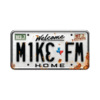Listeners:
Top listeners:
-
 play_arrow
play_arrow
94.3 Rev-FM The Rock of Texas | Where Texas Rocks
-
 play_arrow
play_arrow
99.1 The Buck Texas Country's Number 1 Country
-
 play_arrow
play_arrow
103.7 MikeFM Your Texas Hill Country Mix Tape
-
 play_arrow
play_arrow
KERV 1230 AM
-
 play_arrow
play_arrow
JAM Sports 1 JAM Broadcasting Sports 1
-
 play_arrow
play_arrow
JAM Sports 2 JAM Broadcasting Sports 2

While we may be in the midst of a COVID-19 pandemic, cedar season is almost upon us. It is more important than ever to understand the symptoms and the source of this common central Texas allergy, including details about identifying symptoms of pollen allergies.
Cedar fever isn’t a flu or a virus – it’s an allergic reaction to the pollen released by mountain cedar trees. In Texas, the predominant species of mountain cedar is the Ashe Juniper.
According to Robert Edmonson, a biologist for Texas A & M Forest Service, the pollen isn’t particularly allergenic or harmful, but instead highly concentrated. “There’s just so much pollen in the air that it’s absolutely overwhelming the immune system. It is like trying to breathe in a dust storm.”
The source isn’t just limited to Ashe junipers: in more eastern parts of the state, there are also eastern red cedars that pollinate around the same time, between December and January. Cedar trees are triggered by colder weather.
It is not uncommon for people experiencing cedar fever to mistake their symptoms as a cold or flu. However, there are some sure signs to look out for including itchy, watery eyes, blocked nasal passages and sneezing. Edmonson says that, “If your mucus is running clear, it is an allergy.”
You can treat cedar fever by taking antihistamines after consulting with your physician, keeping doors and windows closed, changing your air conditioning filters, limiting the time you spend outdoors and removing cedar trees from your property.
Experts say that like the COVID-19 virus, a mask might be the best way to fight back. Always be sure to wash masks after use.
For more information visit TexasTree ID.
Written by: Michelle Layton
Similar posts
-
Top popular

Ingram man charged with murder after fatal shooting

Kerr Crime Stoppers offering reward up to $5,000 for information in last week’s non-viable school threat

KISD asks parents to communicate with children about words and actions after ‘copy cat’ threat note found at middle school

City of Kerrville Parks and Recreation reminds citizens that a Red Flag Warning is in effect until further notice

City of Kerrville says that May 7 General and Special Elections will proceed


